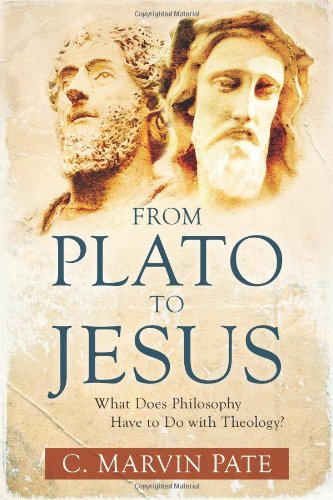Book Blitz continues! This book is as far from the last one as I think one can get.
One of the great things about being a book reviewer for Kregel Academic is that they let me have an extra book, of my choice, as a birthday present. I don’t have to hide in a cave with it, I just have to review it. This year, I asked for C. Marvin Pate’s From Plato to Jesus. Dr. Pate is a professor at Ouachita Baptist University’s Pruet School of Christian Studies. (In the dark ages, it was just the Religion Department.) I am an alumnus of OBU, so I try to keep up with all religion publications from the faculty, because it makes me look smart. Dr. Pate’s hard to keep up with—I’m about a dozen behind on his books.
From Plato to Jesus addresses this question: “What does philosophy have to do with theology?” Obviously, Pate feels the answer is more than “Not a blessed thing.” Instead, he develops the extended answer to this question. He traces first the historical development of philosophy. This begins with the Pre-Socratics and carries forward into the contemporary era of philosophy.
He then traces how philosophy underscores our understanding of theology. In this, he highlights areas where poorly-executed philosophy gives us theological problems. I find this section particularly enlightening.
Is this a book for the broad audience? Despite the blessed presence of footnotes instead of endnotes, I must say that it is not, at least not for the casual reader. One is going to need to invest serious intellectual effort into this book.
First, Pate is writing for a more academic discussion. If you’re typically reading at the popular level, be ready to stretch. Second, he assumes some basic familiarity with the principles of philosophy. We should all have some, but many of us may have forgotten them.
Third, Pate assumes a basic understanding of general theology. Again, for his target audience, that’s fine.
To the great credit of the author, as he works through the second section of this book, he follows a fairly standardized format. (Standardized for this book, chapter to chapter.) For each theological issue at hand, Pate provides one potential way to understand it with both theological and philosophical points, then provides the historically contrasting view. Then he provides the view that reads like the better one, with its proponents. By using this format repeatedly, it is easy for the reader to dig into the actual content.
Who should read this book?
This should be on the reading list for most pastor-theologians-teachers and serious students of the Word of God. I am persuaded that we should read at least one heavy-duty book per quarter, one light-duty book per quarter, one biography, and as much else as possible. This fits that heavy-duty need.
Get it. Read it.
Free book for the review from Kregel Academic. Yes, I always like their books.



No comments:
Post a Comment
To deal with SPAM comments, all comments are moderated. I'm typically willing to post contrary views...but I also only check the list once a day, so if you posted within the last 24 hours, I may not be to it yet.